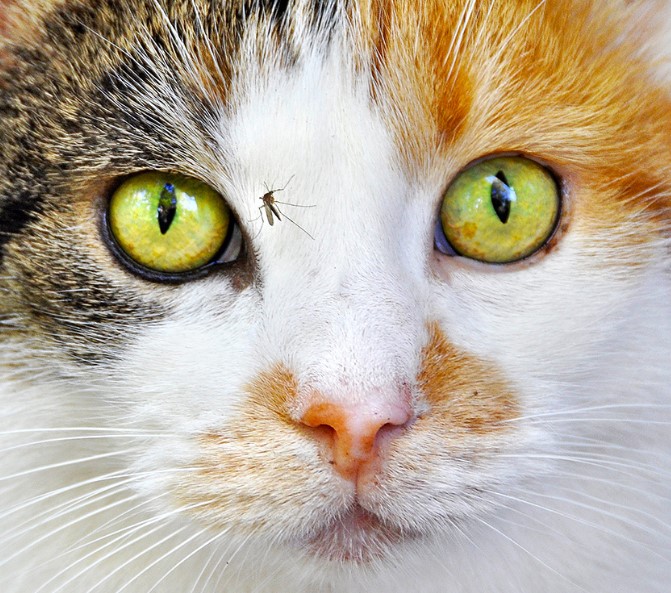Can cats eat mosquitoes? Are mosquitoes harmful to cats?
Cats are natural hunters, and it’s not uncommon to see them pouncing on bugs, including mosquitoes. But as a responsible cat owner, you might wonder: Can cats eat mosquitoes, and is it safe for them to do so? In this article, we’ll explore whether mosquitoes pose any risks to your feline friend and provide tips on keeping them safe from potential harm. Follow Cat Memorial Stones !!
Can cats eat mosquitoes?
Yes, cats can and often do eat mosquitoes. As skilled hunters, they are instinctively attracted to small, moving creatures like insects. Mosquitoes, with their erratic flight patterns, can easily catch a cat’s attention. When a mosquito gets within striking distance, it’s not unusual for a cat to bat it down and eat it.
However, just because cats can eat mosquitoes doesn’t mean it’s always a good idea. Let’s break down the risks and benefits.

Can cats eat mosquito hawks?
No, cats cannot eat mosquito hawks. While cats are natural hunters and may be tempted to pounce on a mosquito hawk, it’s not recommended for them to consume these insects. Mosquito hawks, which are actually crane flies, are not harmful to cats, but they can be a choking hazard.
If you notice your cat trying to eat a mosquito hawk, it’s best to gently discourage them from doing so.
Are Mosquitoes Harmful to Cats?
While a single mosquito is unlikely to cause serious harm, mosquitoes can pose some risks to cats:
- Disease Transmission: Mosquitoes are known carriers of several diseases, including heartworm, which can be fatal to cats. Unlike dogs, cats are more resistant to heartworm, but they are not entirely immune. A mosquito bite can introduce heartworm larvae into a cat’s bloodstream, potentially leading to heartworm-associated respiratory disease (HARD). This condition can cause breathing difficulties, coughing, and lethargy in cats.
- Allergic Reactions: Some cats may have allergic reactions to mosquito bites. This condition, known as feline mosquito bite hypersensitivity, can result in redness, swelling, and itching at the bite site. Cats may scratch or lick the area excessively, leading to further irritation and potential skin infections.
- Toxins and Pesticides: If the mosquitoes your cat catches have been exposed to pesticides or insecticides, there is a chance that your cat could ingest harmful chemicals. These substances can cause mild to severe reactions, ranging from stomach upset to poisoning.
>>> Read: Can Cats Eat Salami?
Can Eating Mosquitoes Make a Cat Sick?
In most cases, eating a mosquito is unlikely to make your cat seriously ill. However, there are some possible side effects to watch out for:
- Gastrointestinal Upset: Some cats may experience minor digestive issues after eating insects, including mosquitoes. Symptoms like vomiting, diarrhea, or reduced appetite might occur, but these are usually mild and resolve on their own.
- Parasitic Infections: As mentioned earlier, mosquitoes can carry parasites like heartworm. While the risk is relatively low for cats, it’s not zero, and prevention is better than treatment.
Can cats get heartworms from eating mosquitoes?
No, cats cannot get heartworms from eating mosquitoes. Heartworms are transmitted through the bite of an infected mosquito. The mosquito must bite an infected animal (usually a dog) to pick up the larvae, and then it must bite a cat to transmit the larvae.

What Should You Do If Your Cat Eats a Mosquito?
If you notice your cat has eaten a mosquito, don’t panic. In most cases, a single mosquito won’t cause any harm. However, it’s essential to monitor your cat for any signs of discomfort or illness. If you observe symptoms such as vomiting, lethargy, coughing, or difficulty breathing, contact your veterinarian immediately.
How to Protect Your Cat from Mosquitoes
Prevention is the key to keeping your cat safe from potential risks associated with mosquitoes. Here are some effective ways to minimize exposure:
- Keep Your Cat Indoors: One of the easiest ways to reduce your cat’s contact with mosquitoes is to keep them indoors, especially during dawn and dusk when mosquito activity is at its peak.
- Use Mosquito Screens: If your cat enjoys sitting by open windows or lounging on the porch, make sure that windows and doors are fitted with tight-fitting screens to prevent mosquitoes from entering your home.
- Avoid Standing Water: Mosquitoes breed in stagnant water, so eliminate any sources of standing water in and around your home, such as flower pots, bird baths, and pet water dishes.
- Consider Cat-Safe Mosquito Repellents: Some mosquito repellents are safe for pets, but many common insect repellents (especially those containing DEET) are toxic to cats. Consult your veterinarian for recommendations on cat-safe mosquito prevention products.
- Heartworm Prevention: Even though heartworm disease is less common in cats, it’s still important to consider preventive measures. There are heartworm preventatives available for cats, so talk to your vet about the best option for your pet.
Conclusion: Should Cats Eat Mosquitoes?
While it’s not unusual for cats to catch and eat mosquitoes, it’s not necessarily beneficial. The risk of disease transmission, allergic reactions, or ingesting harmful chemicals is a concern, even if the chances are low. It’s best to take preventive measures to protect your cat from mosquitoes and consult with your veterinarian about any concerns related to mosquito exposure.
In summary, while an occasional mosquito snack is unlikely to cause harm, it’s always better to minimize your cat’s contact with these pesky insects to ensure their health and safety. Keeping your home mosquito-free and considering preventive treatments like heartworm medication are essential steps to take.
>>> Read: Can cats eat earwigs? What to Do If Your Cat Eats an Earwig
